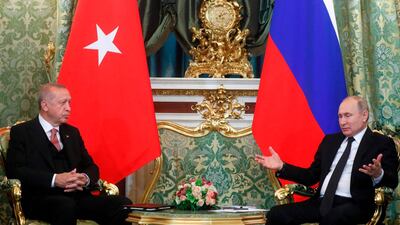The Syrian regime's push to bring about a decisive end of the country’s eight-year conflict is exposing fault lines between the main international players of the conflict: Russia and Turkey.
Earlier this month, forces loyal to Syrian President Bashar Al Assad with Russian and Iranian support began a final assault on Idlib, the last bastion of opposition to President Al Assad.
The province in north-west Syria, which is home to around 3 million residents, is predominantly controlled by an Islamist coalition aligned with Al Qaeda that calls itself Hayat Tahrir Al Sham. The territory’s population has ballooned since the regime allowed civilians and fighters fleeing cities previously retaken by government troops to seek refuge there.
The Syrian government and Russia have been impatient to launch an assault on Idlib that would finally see nearly complete control of the country restored to Mr Assad. But they have been held at bay by Turkey, which insists it can make good on a deal brokered back in September to halt the hostilities.
Iran, Turkey and Russia agreed to stall a final offensive on Idlib back in September after Turkish President Tayyip Erdogan warned of a bloodbath. However, Moscow is running out of patience with Ankara over its inability to reel in Islamists in Idlib and exert control over a buffer zone between the Syrian army and opposition fighters.
“Clearly Idlib is the main point of tension at the moment,” said Yury Barmin, an expert at the Russian International Affairs Council think tank, which was established to advise top officials in Moscow on foreign policy issues.
“Russia greenlighted a limited operation by the Syrian Army there and is providing aerial support,” Mr Barmin told The National.
However, Turkey, which has supported rebels fighting against the Al Assad regime since a series of peaceful protests in 2011 morphed into a full-blown internal conflict, is clearly supporting a push-back against the offensive, he said. “This will prompt a more decisive offensive by Russia to cement control over the southern part of the de-escalation zone.”
Moscow’s relationship with Ankara hit a low point in November 2015, just months after Russia entered the Syrian conflict on the side of the embattled regime of President Al Assad, who was losing swathes of territory to ISIS and moderate opposition groups.
Turkey shot down a Russian jet over Syria’s northern border, prompting a sharp exchange or rhetoric between Mr Erdogan and the Russian president, who canceled visa-free travel between the countries and imposed a ban on some Turkish imports.
In the years since, however, Russia and Turkey with Iran have emerged as the primary brokers of a political solution to the conflict as Western powers including the United States have ceded political and military clout as the opposition groups they buttressed lost ground to Russian airpower and the Syrian army.
Turkey has opposed a large-scale assault on Idlib fearing that the fighting might cause a wave of refugees to flood over its southern border, exacerbating its already strained efforts to offer a safe haven to more than 3 million Syrians who had fled the conflict.
Alexey Khlebnikov, a Russian expert on the Middle East, told The National that the Kremlin has waited as long as it can. “Continuous attacks on Russia’s military base and on Syrian military infrastructure, together with inability of the Turks to separate terrorists from moderate rebels in the province, has made Moscow undertake a somewhat limited offensive in Idlib,” he said.
Turkey’s decision in 2017 to purchase Russian air defenses despite anger from Washington has added an additional level of complication to Russia’s relationship with Turkey in Syria.
US officials have criticised Ankara’s decision to purchase the S-400 air defense system from Russia, saying the hardware is compatible with systems used by the Nato defence alliance, whose members include the United States and Turkey.
Sonar Capatay, director of the Turkish Program at the Washington Institute for Near East policy, noted that when Russian air strikes on Idlib began pushing Syrian refugees towards the Turkish border, Mr Erdogan called his Russian counterpart. “Turkey said no to Washington's offer” to delay the purchase of the S-400, and “Russia stopped bombing Idlib,” he wrote on Twitter.
Ultimately, analysts say, Russia will not jeopardise its relationship with Turkey in order to win more territory for the Assad regime. The two countries have established a working group on Idlib and their defence ministers are in constant contact.
“I don't think Moscow will sacrifice its relations with Mr Erdogan for the sake of grabbing more land for Mr Assad,” Mr Barmin said.
“Although keeping the pressure on the Turkish president in Syria is an important factor that helps Mr Putin have more leverage on Turkey in the wider context.”

